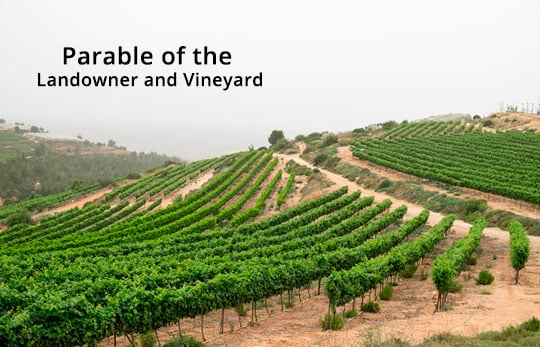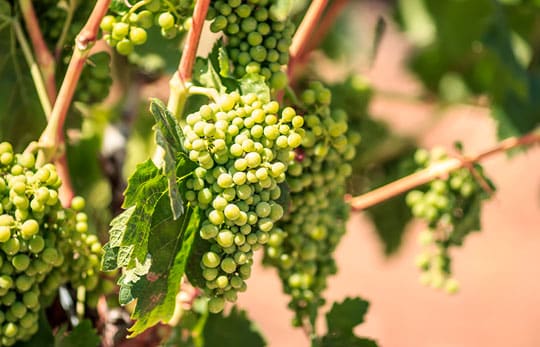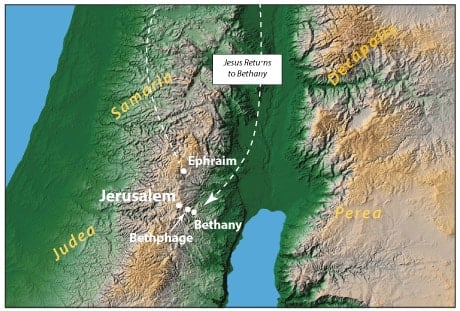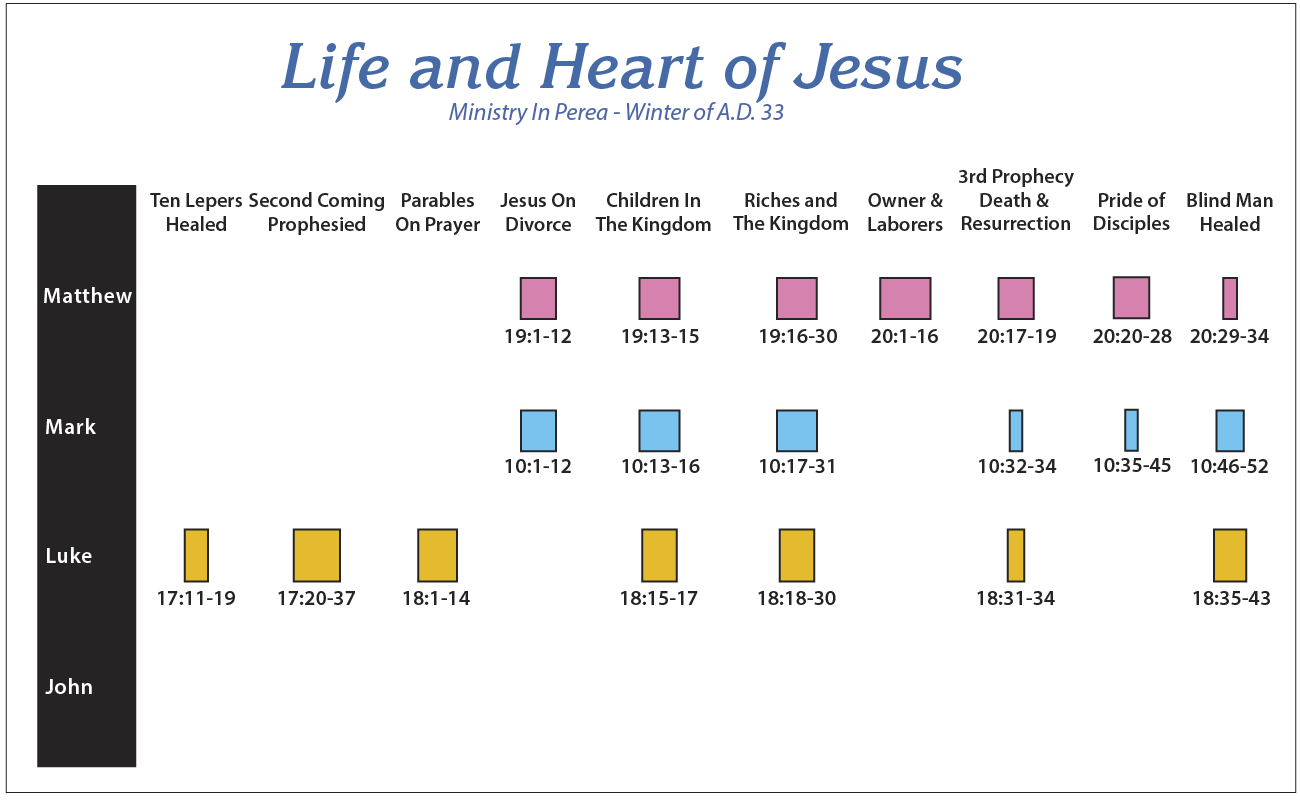
One of the more curious statements that Jesus made during His ministry involves the words “first” and “last.” The first time we find theses words together is in Luke 13:30 when Jesus said, “And behold, some are last who will be first and some are first who will be last.” Notice the word “some.” Some who are last will be first. The next time He used first and last together is recorded in Matthew 19:30 and Mark 10:31 when He said, “But many who are first will be last; and the last, first.” Now notice that He used the word “many” in both passages. Jesus’ message is that many people who think they are first will be last, and many who are last will be first. The final time that Jesus used these two words together is in Matthew 20:16. There He said, “So the last shall be first, and the first last.” So, what did Jesus mean by this curious statement? What is even more interesting is that Jesus used this expression to teach something about the kingdom of heaven. So, what did Jesus mean that in the kingdom “the last shall be first, and the first last”? You will discover the answer in this study, which comes from Matthew 20:1-16.
The Workers Are Hired
Matthew 20:1-16 is about the parable of the laborers and the vineyard. That is the title usually given to this passage of Scripture. This parable gives us a very important principle about salvation. So, let’s discover what the parable is about and then explain its meaning.
Beginning in verse 1, we are told that Jesus compared the kingdom of heaven to a landowner who wanted to hire some laborers for his vineyard. Verse 1 says,
For the kingdom of heaven is like a landowner who went out early in the morning to hire laborers for his vineyard. Matthew 20:1 (NASB)
When Jesus said the kingdom of heaven is “like,” it becomes immediately obvious that Jesus is giving a parable. He used the word “like.” That is the kingdom of heaven is like something else. A plain sense reading of this verse teaches us that the kingdom of heaven is “like” a landowner who owns a vineyard.
Many vineyards in Palestine were typically located on the slopes of hills so that the sunshine could beam directly onto the vines. Some vineyards were in the Plain of Esdraelon and in Jericho. Most of the vines were allowed to grow on the ground since it was believed the grapes would ripen more slowly and produce a better grape. Consequently, harvesting the grapes was a dirty, sweaty work during the harvest months of July to October.
Verse 2 tells us the landowner agreed to pay some laborers a denarius to work all day in the vineyard.
When he had agreed with the laborers for a denarius for the day, he sent them into his vineyard. Matthew 20:2 (NASB)
A denarius was a Roman silver coin. It was the normal wage for one day of labor. The Greek word for laborer is ergates. It refers to someone who performed strenuous work. So, the landowner hired some men to perform physical labor in one of the hardest professions in ancient Israel during the hot summer months.
Next, we are told that at about 9:00 a.m. the landowner went looking for more workers. Verses 3 -4 say,
And he went out about the third hour and saw others standing idle in the market place; and to those he said, ‘You also go into the vineyard, and whatever is right I will give you.’ And so they went. Matthew 20:3-4 (NASB)
The third hour corresponds to 9:00 a.m. in our time because the Jewish day started at 6:00 a.m. So, the landowner found some workers in the marketplace waiting to be hired. But this time the landowner did not tell them how much he would pay them. Instead, he just said he would pay them what is “right.” So, the workers left the landowner, went to the vineyard, and worked. They did not sign a contract before performing the work, nor did they demand to know how much they would be paid. We are told the workers trusted the landowner to pay them what was right.
Later in the day, verse 5 says, the landowner went looking for more workers.
Again he went out about the sixth and the ninth hour, and did the same thing. Matthew 20:5 (NASB)
The sixth hour would correspond to noon or 12:00 p.m. and the ninth would correspond to our 3:00 p.m. Each time the landowner hired more workers. We are not told why he hired more workers so late in the day, nor are we told how much he offered to pay them. But since this is a parable, the reason is not important. But the amount of the wage is important, as you will soon discover. So the workers began working in the vineyard at different times throughout the day. We are not told if they gathered the grapes, thinned the pea-sized berries, removed leaves, or pruned some grapes to improve quality. Those details are obviously not important to the parable. What is important is that the workers accepted the wage that was offered and worked.
Verses 6-7 tell us that once again the landowner hired more workers at 5:00 p.m., one hour before the end of the workday.
And about the eleventh hour he went out and found others standing around; and he said to them, ‘Why have you been standing here idle all day long?’ They said to him, ‘Because no one hired us.’ He said to them, ‘You go into the vineyard too.’ Matthew 20:6-7 (NASB)
Notice the landowner’s words. He asked, “Why have you been standing here idle all day long?” “All day long” reveals they had not worked since 6:00 a.m. The landowner knew they had been standing idle all day, yet he hired them. Then they went and worked until 6:00 p.m.

The Wages Are Paid
Next, Jesus moved to the end of the workday when the workers were paid. He said,
When evening came, the owner of the vineyard said to his foreman, ‘Call the laborers and pay them their wages, beginning with the last group to the first.’ When those hired about the eleventh hour came, each one received a denarius. Matthew 20:8-9 (NASB)
We are told that when the evening came, which would have been 6:00 p.m., the owner of the vineyard asked the foreman to pay the laborers. Now, who is the foreman? He is the one who would have determined the tasks that each worker would have performed.
It is important to notice that how much the workers would be paid is not discussed. The amount of the wage was already understood. It is also important to notice that the last group was paid first. That seems strange since they had worked only one hour. It is also important to notice they were paid a denarius. That was the amount of money promised to those who started working at the beginning of the day!
Verses 10-12 give us the reaction of those who started working at the beginning of the day.
They complained when they said, When those hired first came, they thought that they would receive more; but each of them also received a denarius. When they received it, they grumbled at the landowner, saying, ‘These last men have worked only one hour, and you have made them equal to us who have borne the burden and the scorching heat of the day.’ Matthew 20:10-12 (NASB)
When we are told they “grumbled at the landowner,” the literal Greek communicates that they were repeatedly murmuring against the landowner. They were upset that they had worked more than others all day in scorching heat, but received the same pay as those who had worked only one hour. They emphasized the heat in which they worked, compared to the cooler part of the day in which the other men had worked. Now, this is an interesting parable! Those who had been hired last were paid first. Now those who had been hired first, are paid last.
How did the landowner respond to their complaint? Verses 13-15 give us the landowner’s reply.
But he answered and said to one of them, ‘Friend, I am doing you no wrong; did you not agree with me for a denarius? Take what is yours and go, but I wish to give to this last man the same as to you. Is it not lawful for me to do what I wish with what is my own? Or is your eye envious because I am generous?’ Matthew 20:13-15 (NASB)
The landowner replies with grace. He called one of the men “friend.” The Greek text tells us that the landowner told the man, “I did not act unjust toward you.” The important word is “unjust.” It means the opposite of what is right. We could say the landowner said that he had treated them right. Remember that at the third hour (v. 4) the landowner told those workers he would do what was right, and they trusted him. Then the landowner reminded them that they had agreed to work all day for one denarius.
Finally, he reminded these complainers that he had the right to do as he wished with his own money. Maybe they had the sin problem called greed.

Parable of the Landowner and Vineyard Explained
So, what is the meaning of this parable? In order to understand this parable we must answer ten questions. First, what is the kingdom of heaven? The gospel of Matthew is the only gospel that uses the term “kingdom of heaven.” The other gospels just say kingdom. Matthew 7:21 reveals the kingdom of heaven is also called heaven. That is, the kingdom is where God, the angels, and the saints will live. It is called heaven. Second, who is the landowner? Since the kingdom of heaven is heaven, and the landowner owns heaven, this means the landowner is God the Father. The message of Scripture is that God the Father has planned for the current heaven to some day become a visible reality on earth. It will be the millennial kingdom. God the Father owns the invisible and future visible forms of the kingdom (Matthew 25:34).
This gives us the answer to the third question, “Who is the foreman?” That is Jesus Christ. Jesus himself tells us that He agreed to come to earth and die for our sins (John 10:17-18; Hebrews 10:5-10). Romans 5:6 and Galatians 4:4 says He came at the right time. 1 Corinthians 15:1-8 describes the gospel which is that Christ died for our sins, was buried, and then was resurrected and appeared to many. Ephesians 2:8-9 says,
For by grace you have been saved through faith; and that not of yourselves, it is the gift of God; not as a result of works, so that no one may boast. Ephesians 2:8-9 (NASB)
The fourth question is, “Who are the workman or laborers”? The answer is people who believed God and responded to the Father’s call. It is clear from the parable that the Father did not ask all of the men at one time. He only chose certain ones and at specific times. When He asked certain ones to work in His vineyard, they responded. It illustrates salvation. Ephesians 1:4-5 tells us that God the Father chose who would be saved before the foundation of the world. Then the Father predestined people to be adopted and redeemed (Ephesians 1:5-7). John 6:65 tells us that the Father must grant people permission to come to Christ. John 6:44 says the Father draws to Christ those whom He granted to come to Christ. Then John 6:37 says the individuals the Father grants and draws or calls to Christ will come to Christ. In the parable the Father decided to whom He would offer work. Then He asked them to work. They trusted and worked hard in the scorching heat. That is an accurate description of what it is like to be a Christian.
The fifth and sixth questions are, “What is the significance of the phrase ‘whatever is right I will give you,’” and “Where is faith illustrated in the parable”? First, faith is illustrated by the laborers willingness to work hard in the summer heat in the vineyard and trust the Father to give them what is “right” at the end of the day. “To give them what is right” reveals the workers trusted God the Father to reward them. That illustrates the Father’s gift of forgiveness for sins and of eternal life. The laborers heard the gospel of salvation is offered by grace through faith in Christ alone and not by works (Ephesians 2:8-9).
The seventh question is, “What does it mean they worked in the vineyard all day?” The answer corresponds to the proof of faith. Because they believed in Christ, they faithfully worked hard for Him. A willingness to work hard is the evidence that believers have real faith (1 Corinthians 15:2).
The eighth question is, “What is the wage given to the laborers?” It is what the Father promised them. He promised to give them what was right. The “wage” was what is right. It is eternal life. That reward is the same for each believer no matter at what point in their life they come to faith or the order in which believers place their faith in Christ.
The ninth question is, “What is the work day?” It is the believer’s life. As we have already stated, God the Father chose people to believe in Christ and be saved before they were born. Then sometime during their lives, God the Father calls them, declares them to be holy, gives them the faith (Acts 3:16; Ephesians 2:8-9; 2 Peter 1:1), makes them a new creature, and gives them eternal life (Ephesians 2:6; 1 Peter 1:3-5).
The tenth question is, “What is the ‘evening’?” It is eternity. That means “morning” is the beginning of one’s life.
This parable paints an important picture of salvation. God the Father went looking for the laborers. They did not seek Him. Repeatedly, the parable tells us the workers were idle. They were not looking for God. They were not looking to work. Then God the Father called them to work in the vineyard or heaven. They responded to His offer and trusted that He would do what is right. When the end of their life came, Christ gave them eternal life in heaven.

Conclusion
The last verse is the climax of the parable. It is a very interesting riddle.
So the last shall be first, and the first last. Matthew 20:16 (NASB)
We started this study with a brief discussion of Jesus’ statements regarding the first and the last. In every other statement, Jesus had included the words “some” or “many.” That is, “Some are last who will be first and some are first who will be last,” or “Some who are last will be first” (Matthew 19:30; Mark 10:31; Luke 13:30). But this time, He did not include those important words. He simply said, “So the last shall be first, and the first last.”
So, what did He mean? The answer is found in the parable itself. The parable is designed to explain the meaning of this riddle. First, we must remember that the first laborers who were hired last, were paid first (verse 8-9). The owner of the vineyard ordered that the last be paid first. Second, we must remember everyone was paid the same wage of one denarius. Third, the first laborers who wanted more are described as being envious or greedy (verses 13-15). This gives us the meaning of the riddle, which is that the same gift of salvation is given to everyone without regard to their works. The Father forgives every believer of their sins, independent of their faithful service. That is the Father’s criteria for being saved.
This gives us several important principles. The first principle is that God the Father has established the requirements for salvation. For in verse 15, the owner asked the rhetorical question, “Is it not lawful for me to do what I wish with what is my own?” That is, the Father alone has determined the conditions for someone to be saved.
The second principle is that the condition for salvation is that believers must believe the Father will give to believers what is right (v. 4). That is, we must believe the Father and in Christ. Romans 3:26-27 reveals that the Father has established faith as the basis of salvation. For He knew that if we had to earn our salvation, we would not succeed.
Third, the free gift of salvation is given equally to every believer. Ephesians 1:3-4 says that the Father has blessed every person He has chosen for salvation with “every spiritual blessing.”
Blessed be the God and Father of our Lord Jesus Christ, who has blessed us with every spiritual blessing in the heavenly places in Christ, just as He chose us in Him before the foundation of the world, that we would be holy and blameless before Him. Ephesians 1:3-4 (NASB)
That is, the gift of salvation is given equally to every believer. Again, that is the meaning of the riddle in this parable.
But this does mean that every believer will receive rewards at the Bema Seat Judgment depending upon faithful service? The message of the riddle is that everyone is equally given salvation. No believer is more saved than another believer. This also agrees with Jesus’ teaching that occurred just before He gave this parable (Mathew 19:27-30; Mark 10:28-31; Luke 18:28-30).
The fourth principle is that the Father keeps calling those individuals He has chosen to be saved. We have already discussed that principle. 2 Peter 3:9 states that the Father is delaying the end of the world until everyone He has chosen to be saved is saved. In the parable, the Father even hired laborers at the eleventh hour. That would seem to be a foolish act, but it illustrates 2 Peter 3:9. The thief on the cross is another illustration. He was saved during the last hours of his life.
The fifth principle is the Father calls those whom He has chosen and those who desire to be saved will respond (Romans 8:28-29; Ephesians 1:3-5; 2 Thessalonians 2:13-14; 2 Timothy 2:10; Titus 1:1-2; 1 Peter 1:1-2). The teaching of the New Testament is that the Father calls those whom He has chosen to be saved. He gives them the gift of faith (see previous discussion) to believe. In addition, Scripture also promises that anyone who desires to be saved will be saved. It is a promise. Romans 10:11-13 states,
For the Scripture says, “WHOEVER BELIEVES IN HIM WILL NOT BE DISAPPOINTED.” For there is no distinction between Jew and Greek; for the same Lord is Lord of call, abounding in riches for all who call on Him; for “WHOEVER WILL CALL ON THE NAME OF THE LORD WILL BE SAVED.” Romans 10:11-13 (NASB)
In the parable, the owner offered work, but the person also had to respond (Matthew 20:2,4).
The sixth principle is that God the Father is sovereign in salvation. The landowner did as He pleased. He alone offers salvation and the benefit of faith—eternal life. It is interesting to notice that in the New Testament believers are given so few details about what eternal life will be like. Another message of the parable is that believers are to trust Him to do what is right.
The seventh principle is that eternal life is equally and fully given by God the Father to every believer. We can trust God the Father to fully and completely save you and me! He does not play favorites in regard to salvation. He is impartial, gracious, just, and faithful in salvation. As John MacArthur states,
God’s grace is the great equalizer that removes sin and makes every believer equally acceptable to Him in Christ.[1]
Reference:
1. John MacArthur. Matthew 16-23. The MacArthur New Testament Commentary. Moody Bible Institute. 1988. p. 217.
Suggested Links:
Are the Kingdom of God and Kingdom of Heaven the same?What did Jesus mean by the kingdom? — Repent for the kingdom
Thy Kingdom Come
Parable of The Great Kingdom Banquet
Receive the Kingdom of God Like a Child
How many kingdoms are there in the Bible?
Why did Jesus say the Kingdom of God was in their midst?